Resource 1: Healthy living practices
![]() Background information / subject knowledge for teacher
Background information / subject knowledge for teacher
The following information is useful for different topics associated with healthy living. Use this as a resource for designing activities and guiding discussions.
A. Good and bad foods
It is important to eat and, if possible, to eat a balanced diet. In Ghana, there are six food groups and each group helps us in different ways.
Animal foods and animal products. This is the first group. Examples include meat, chicken, fish, snails, eggs, milk, cheese. These foods when eaten provide the body with protein. Proteins help us to grow big and strong.
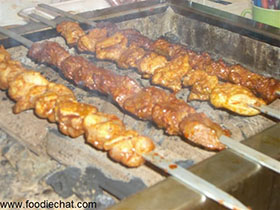
Beans, nuts and oily seeds. This group includes beans of all kinds – for example cowpea, bambara beans, broad beans, soya beans, groundnuts, cashew nuts, agushie, were-were or neri. This group provides the body with plant protein. Protein from these sources also helps us to grow big and strong.
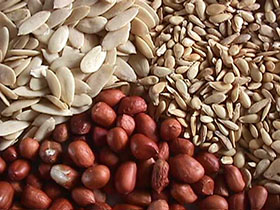
Cereals and grains. These include corn (maize), guinea corn, sorghum, millet. This food group provides the body with carbohydrates. Carbohydrates give us heat and energy. Carbohydrate foods are termed energy-giving foods.
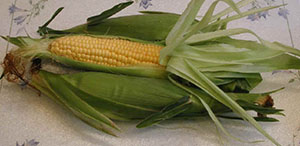
Fruits and vegetables. Examples are oranges, pineapple, pawpaw, banana, avocado pear, tomatoes, onion, carrots, cabbage, garden eggs, okro, kontomire, aleefu, pepper, bomma. Fruits and vegetables provide the body with vitamins and some minerals. These protect us against diseases and also help with normal growth and development.

Fats and oils. Examples include palm oil, shea butter, palm kernel oil, soya bean oil, frytol. This food group provides the body with mostly heat and energy.
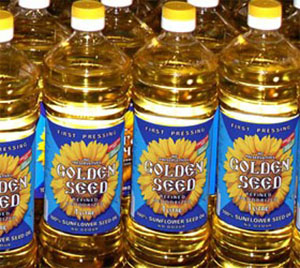
Starchy roots, tubers and plantain. This group includes plantain (apem, apantu), cocoyam, yam, cassava, kooko, sweet potato. These are major sources of carbohydrates in the Ghanaian diet. They therefore give us heat and energy.
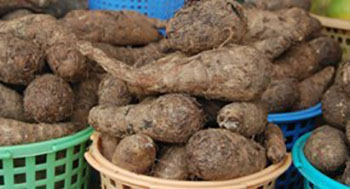
Eating a mixture of these foods gives us good nutrition. Eating only one of these things every day can cause health problems. However, some food is better than no food.
Many children like to eat sweets and sugar. This is fine in small amounts, as it gives us energy. But too much sugar is bad for the teeth because it can cause tooth decay. Too much sugar can also make us fat.
B. Keeping food safely
To keep food safely, there are a number of things you need to think about.
Firstly, foods can go bad or rot. These include most vegetables, fish and meat, but some take longer to go bad than others. They go rotten when they have been left alone too long. When they rot, they start to smell awful, and if you eat them they can make you sick.
To stop fresh food from rotting, it is good to keep it in a cool part of the house or kitchen, away from heat and damp. Another way to stop fresh food rotting is to preserve it. This involves drying the meat, fish or vegetables such as pepper, okra either in the hot sun or over a fire. Fish is also salted and then dried in the sun (koobi).
Secondly, some food, especially food in cans, can go bad if it is kept too long and not stored properly.
Thirdly, some food, especially meat, can make us sick if it is cooked once and then heated up again but not reheated thoroughly. It is best to only cook what you are going to eat on that day. If you do heat up cooked food, make sure it is properly heated through.
Finally, animals including many insects also like food, but if they touch our food they leave germs that can give us diseases and illnesses. Try and keep food away from animals. If you have a box or container to keep it in, this is best.
C. Keeping our surroundings clean
We clean our surroundings to protect us from dirt and diseases. People can get ill from coming into contact with many different things. These include:
- animals and insects;
- rotting food;
- rubbish;
- animal and human faeces;
- chemicals;
- dirty clothes.
For this reason, it is good to clear these things away from where we live, eat or sleep. You can do this easily by cleaning your surroundings every day and collecting the rubbish and dirt in one place away from where you stay.
D. Good and bad hygiene practices
There are many kinds of good hygiene practices you can do every day. The reasons for these are to keep us clean and to protect us from picking up illnesses.
Some good practices include:
- washing ourselves every day if possible;
- cleaning our teeth every day if possible ;
- washing our hands before eating or cooking;
- washing our hands after going to the toilet;
- keeping our house, clothes and surroundings as clean as possible;
- not going to the toilet near the house or kitchen;
- not leaving food lying around in the open.
E. Exercise
Any regular exercise is a good thing, but it is always good to try and make it a habit.
The sorts of exercise that you can do regularly include:
- walking or running to school;
- playing games, e.g. football and netball
- swimming;
- working in the field;
- housework.
It is important to try and do some exercise every day, because it helps build up your muscles, your heart, and your overall fitness. If you don’t exercise regularly, you will find it more difficult when you try to. You will feel weak and short of breath.
Adapted from: Centre For Indigenous Knowledge Systems (CEFIKS)
3. Using local resource people



